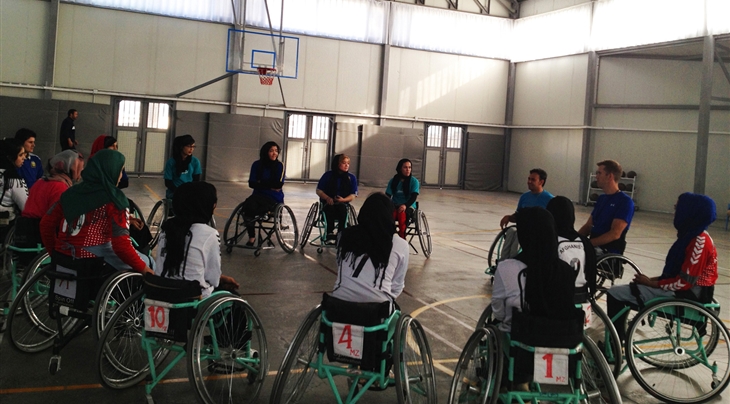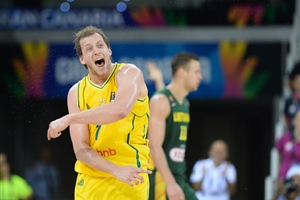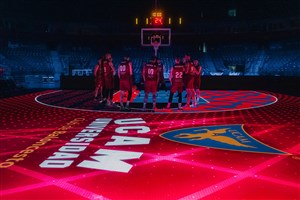
As the wheel world turns
CHARLOTTE (Steve Goldberg's Wheel World) - So it's the day after Christmas, one of the best times - trust me on this - to buy large quantities of chocolate, gingerbread cookies and peppermint infused candy on sale. It's also a time to unwrap a few presents from the wheel world.
At a Charlotte Hornets game last week, I had the chance to talk with NBA Commissioner Adam Silver about the global impact of the NBA as it works with FIBA to grow the game. He mentioned India as one country where basketball was becoming more popular.
How right he was. The very next day, I came across a wonderful story in the Times of India about wheelchair basketball at the Indian Spinal Injuries Centre (ISIC) hospital in New Delhi.
Along with using the game for rehabilitative purposes, the ISIC was conducting a workshop in association with the Wheelchair Basketball Federation of India (WBFI) to promote awareness about disability sports in India, and was targeted at coaches and community leaders. The WBFI has been organizing these clinics around the country all through December in an effort to recruit new players, coaches and officials to the game.
Manish Kumar, 23, told the Times: "Life is never the same after one is confined to the wheelchair, but sports have given me a new life".
Kumar had competed in judo and gymnastics before his legs were paralyzed in a bike accident. Now his focus is on basketball.
The Chennai Eagles are the pioneering team of Indian wheelchair basketball. The team in the southern coastal city about 2,165 kilometers (1,345 miles) south of New Delhi even has its own promotional video on YouTube.
The squad is coached by Australian Mark Walker who was the head coach for the Rollers' 1996 gold medal team at the Atlanta Paralympics. He has also coached the South African and Thailand national wheelchair basketball teams along with standing teams at almost every level.
Walker has written a very detailed 50-page wheelchair hoops coaching manual (you can download at no charge here) that covers everything from coaching philosophy and styles to wheelchair setup and the benefits of compression clothing and sleep to the athlete.
The club is run by Madhavi Latha Prathi, who is still a competitive Paralympic swimmer and an MBA graduate in banking and finance. She is also the president of the WBFI.
Jess Markt, the former New York Rollin' Knicks player who has been working for the International Committee of the Red Cross (ICRC) in developing wheelchair basketball in Afghanistan, is also involved with the game in India.
You can see his smiling face in many photos on the WBFI's Facebook page.
Last June, I wrote about Markt and the emergence of wheelchair basketball in Afghanistan - including a men's national team that he coaches - and the positive effect it was having not just on the court but off it as well in altering the attitudes and perceptions of disability to both those using wheelchairs and the broader public as well.
If it was good for the men, it has been even more liberating for the country's female wheelchair basketball players.
As a nation, Afghanistan had competed in 10 Olympic Games since 1936 but it wasn't until their 11th, in Athens 2004 that the team included female athletes. There were two, 100m sprinter Robina Muqimyar and Friba Rezihi, who competed in judo, which made them 40 percent of the five athlete delegation.
Under Taliban rule, they couldn't even train in country. Even after that changed, many conservative leaders and clerics were still not comfortable in a world where women were athletes. Rezihi told the BBC before the games: "It's like a gold medal for us to participate as Afghan women after a long, long time."
The first Paralympic Games for Afghanistan was Atlanta in 1996 where two men competed in cycling. Four years later, the country was banned from Sydney due to its treatment of women under Taliban rule. In 2004, two more athletes went to Athens, one a female sprinter named Mareena Karim.
So for female athletes with an impairment, they are breaking barriers to both disability and gender.
In an article for the French agency Agence France-Presse at the end of October, Mushtaq Mojaddidi wrote about the final of the country's third annual women's competition which was once again organized by the ICRC.
According to Alberto Cairo, head of the Red Cross's orthopedic program in Afghanistan, the best players from the tournament will make up the women's national team. That opportunity was the gift that 23-year-old Aziza Ahmadi hoped to achieve. Paralyzed in her left foot since shrapnel from a mortar attack on her Kabul home hit her 18 years ago, Ahmadi said: "My dream is to go to play in European countries like Italy, Germany and France."
The Afghani men made their first trip out of country to Italy this past year. I hope Aziza gets her chance to do that in the next one.
And I hope that all your holiday wishes came true as well. Please pardon the pun when I say: "Peace on Earth and good wheel towards men."
And women of course.
Bonne année. Ein glückliches neues Jahr. Xin nian yu kuai. Feliz año Nuevo. Heri za Mwaka Mpya. Akemashite Omedetou Gozaimasu. Kul 'am wa antum bikhair. Gott Nytt År.
Best wishes to you all for the new year.
Steve Goldberg
FIBA
FIBA's columnists write on a wide range of topics relating to basketball that are of interest to them. The opinions they express are their own and in no way reflect those of FIBA.
FIBA takes
no responsibility and gives no guarantees, warranties or
representations, implied or otherwise, for the content or accuracy of
the content and opinion expressed in the above article.
To help
make this column as inclusive as possible, please send any national or
international event information, story suggestions, or comments to wheelworldmail@gmail.com.
















